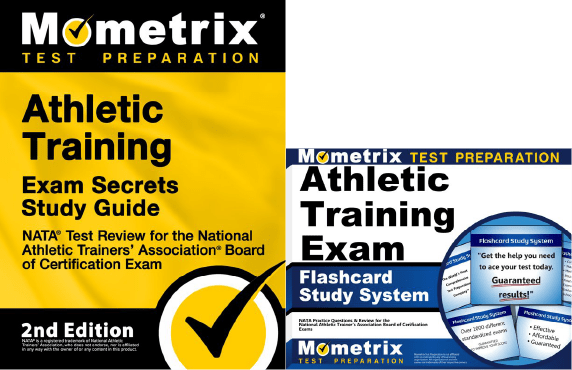If you need help studying for the BOC Athletic Training exam or just want some more information about what the test is like, you’ve come to the right place.
Click below to take a free Athletic Training practice test!
Exam Eligibility
Before you can register to take the BOC Athletic Training exam, you’ll need to graduate from a CAATE-accredited program with at least a bachelor’s degree.
If you meet one of this requirement, you’re set to begin the registration process!
What’s on the Exam?
First, let’s talk about the questions on the exam. There are 175 multiple-choice questions total, but only 150 of the questions will count toward your score. Why is that?
The 25 unscored questions on the exam are called “pretest” questions. These are added to the exam to determine if they’re good enough questions to add to future versions of the test.
The trick is that you won’t have any way of knowing which questions are scored and which ones are pretest. They will appear just like the scored questions throughout the test.
The time limit for the exam is 4 hours. There aren’t any scheduled breaks, but you’re free to take restroom breaks as needed.
Let’s take a closer look at the different sections of the exam.
1. Risk Reduction, Wellness, and Health Literacy
20% of the exam
- Identifying risk factors by administering assessments, examinations, and reviewing histories
- Implementing plans to reduce risks with evidence-based strategies
- Promoting health literacy by educating patients and stakeholders
- Optimizing wellness for individuals and groups
- Facilitating safety by responding to environmental conditions
2. Assessment, Evaluation, and Diagnosis
25.6% of the exam
- Obtaining a thorough history using observation and interviews
- Performing a physical examination with diagnostic techniques
- Formulating a diagnosis based on history and examination findings
- Establishing a care plan from the diagnosis
- Educating patients and stakeholders on the care plan and prognosis
3. Critical Incident Management
20.8% of the exam
- Implementing emergency action plans to ensure appropriate responses
- Assessing the scene to determine appropriate actions
- Triageing health conditions to prioritize care
- Implementing evidence-based procedures to reduce risks
4. Therapeutic Intervention
25.6% of the exam
- Implementing emergency action plans to ensure appropriate responses
- Assessing the scene to determine appropriate actions
- Triageing health conditions to prioritize care
- Implementing evidence-based procedures to reduce risks
How to Register
To get started, you’ll need to submit an application on Board of Certification (BOC) website. The application will ask you for your contact information and any documentation to prove your eligibility (among other things).
When you submit the application, you’ll also need to submit the application fee, which is $100. If you’re an NATA member, you will only have to pay $75.
Once your application is approved, you’ll be set to pay the exam fee and schedule a testing appointment. The exam fee is $375.
Exam Scores
The test is scored using a scaled scoring method. Here’s how it works:
For every question you answer correctly, you get one point added to your raw score. At the end of the test, your final raw score will be converted to a scaled score. This scaled score will range somewhere between 200 and 800.
The reason your raw score is converted to a scaled score is because everyone who takes the test is given a slightly different set of questions. Since everyone has a different arrangement of questions, and because some questions are harder than others, converting your raw score to a scaled score ensures a more even playing field.
Retaking the Exam
If you didn’t get a passing score on your first try, that’s okay! You can register to retake the test.
Keep in mind that you will have to pay the full testing fee for each attempt.
FAQs
How many questions are on the BOC Athletic Training exam?
The exam contains 175 questions.
What is the time limit for the BOC Athletic Training exam?
The exam is timed at 4 hours.
What is the passing score for the BOC Athletic Training exam?
You’ll need to get a final scaled score of at least 500 to pass.
How much does the BOC Athletic Training exam cost?
The testing fee is $375.



 Athletic Training Study Guide
Athletic Training Study Guide Athletic Training Flashcards
Athletic Training Flashcards